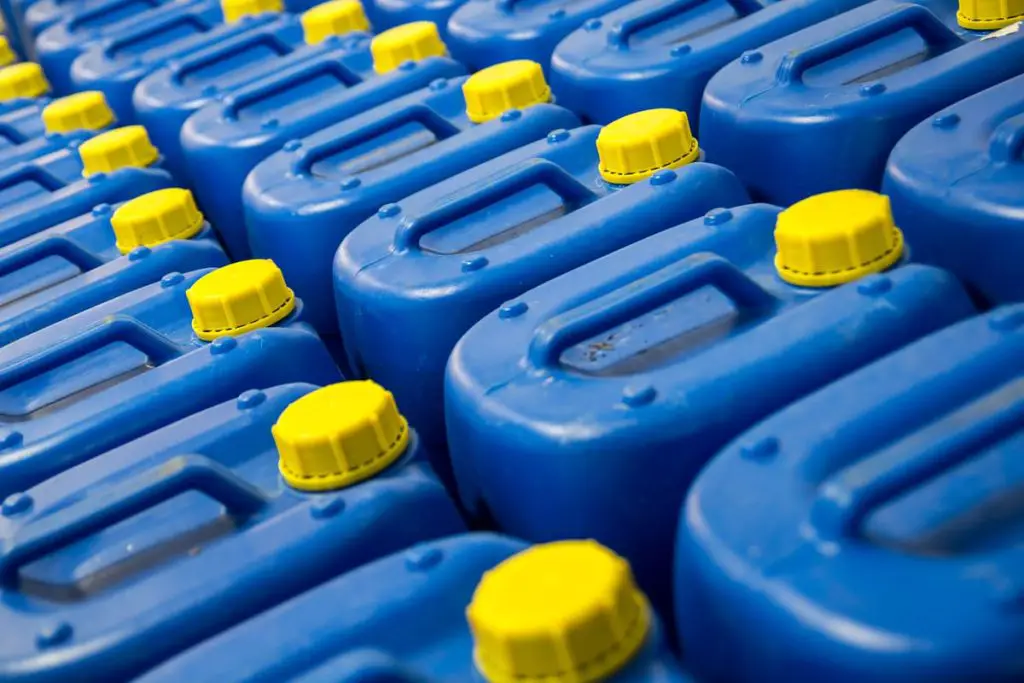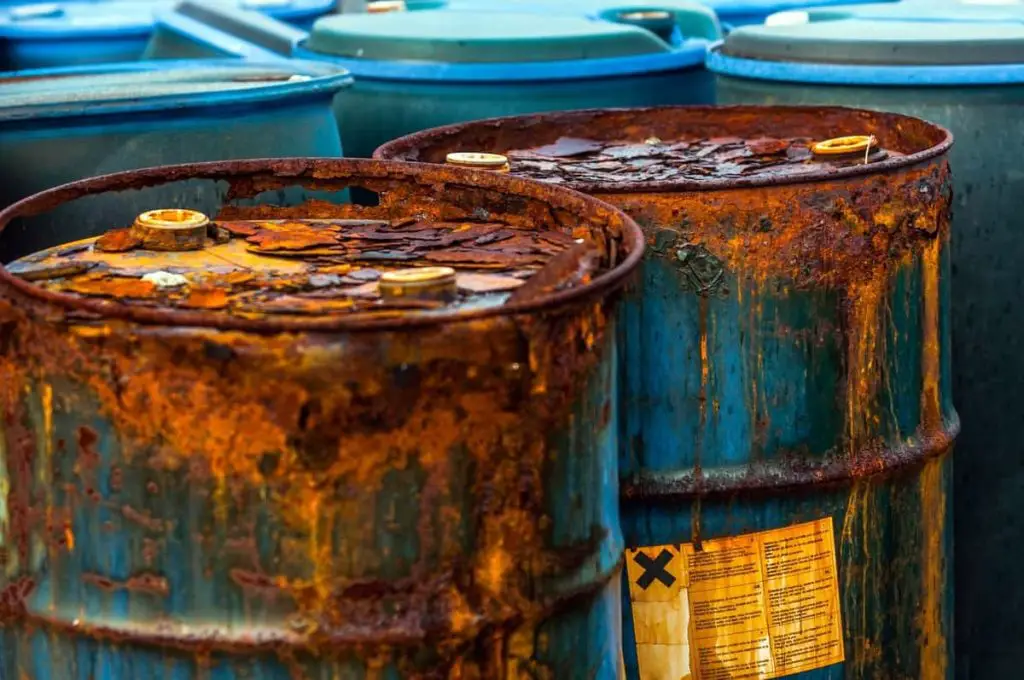Pool cleanliness is essential to prevent skin and respiratory problems when swimming. To keep your pool clean, you may have to use a wide range of pool chemicals such as balancers, sanitizers, oxidizers, and other cleaning materials. However, storing certain pool chemicals together can be unsafe.
Here are 7 pool chemicals that you should never store together:
- Organic and inorganic chlorinating agents
- Chlorine and pool acids
- Pool shocks and enzymes
- Cyanuric acids and stabilized chlorine
- Clarifiers and sequestering agents
- Old and fresh chemicals
- Pool chemicals and water
Let’s look at these chemical combinations and why they shouldn’t be stored together. We’ll also look at what you can do to store pool chemicals safely.

1. Organic and Inorganic Chlorinating Agents
Pool chlorinating agents are essential pool cleaning chemicals and can help balance the pool’s acidity. However, organic and inorganic chlorinating agents are distinct and shouldn’t be mixed. Storing organic chlorinating agents, also known as “chlorinated isocyanurates,” with inorganic chlorinating agents such as calcium hypochlorites may pose the risk of fires and explosions.
Mixing organic and inorganic chlorinating agents can also trigger the release of toxic chlorine gas, which may cause respiratory problems. These chemicals are very similar, so many people confuse them to be in the same category and mistakenly store them together.
Out of all the pool chemical combinations to avoid, organic and inorganic chlorinating agents are the most dangerous.
2. Chlorine and Pool Acids
Chlorine mixed with any acid will release chlorine gas and heat. The type of chlorine mixture and acid combination will affect how much heat is produced. Always keep chlorinating agents and pool acids far away from each other since liquid acid spills can easily cause toxic chlorine gas to be released.
Always handle pool acids with extreme care since they’re more likely to cause explosions and toxic gas releases. You’ll also have to take care not to store certain acids in metal boxes to avoid explosions and chlorine evaporation.
3. Pool Shocks and Enzymes
Pool shocks are chlorine-based products that can help kill algae and other microorganisms in dirty pool water. However, using them in the pool simultaneously with enzymes will disrupt the effectiveness of the enzymes.
Here are some products to keep away from pool shocks:
- Pool Enzymes: Always wait for the pH level to normalize before using pool enzymes. While a mixture of pool shocks and enzymes won’t cause severe chemical reactions (except in the case of trichlor tablets), it’ll make the enzymes ineffective.
- Algaecide: Don’t use pool shock and algaecide together as the mixture will deactivate the enzyme. In addition, avoid overdosing the pool with algaecide.
- Trichlor Tablets: A reaction between pool shocks and trichlor tablets can cause fires or explosions. Keep these two chemicals as far away from each other as possible.
- Sequestering Agents: Wait a few days after using pool shocks before adding sequestering agents to the pool to get the maximum stain removal effect.
While water is necessary for any reaction to occur between pool shocks and the items mentioned above, weather conditions or several other factors in your pool storage area may generate enough moisture to trigger a reaction.
Be sure to store these products away from pool shocks in a cool and dry location to prevent any of the risks discussed.
4. Cyanuric Acids and Stabilized Chlorine
There’s no inherent harm in storing cyanuric acids with stabilized chlorine. However, if these chemicals mix, it may result in CYA (cyanuric acid) overdose in your pool. The pool’s pH levels will become too high, and you’ll have to drain the pool to stabilize it.
Since CYA is hardly used in pools, it’s better to store it further away from the stabilized chlorine, which you’ll be using more frequently.
5. Clarifiers and Sequestering Agents
Clarifiers are used to clear up cloudy water and are often used to clean murky and green pools. Sequestering agents have the opposite and cause metals to bond in the water, keeping the heavy metals unreactive. Both are essential to keep your pool clean.
However, if you store a sequestering agent along with a clarifier, it may cause both chemicals to lose their effectiveness. Never use these pool chemicals together since it may cause cloudy water that won’t go away with pool filtration.
While this chemical reaction isn’t dangerous, it’ll cause both chemicals to get wasted.
6. Old and Fresh Chemicals
Sometimes storing fresh and old chemicals of the same type together can also cause chemical disruptions. Many types of chlorination agents and pool acids will lose their integrity over time, so they have expiry dates. Mixing new and old chemicals usually causes chemical reactions which release toxic gases.
You can use old and new pool chemicals as long as they are not expired. However, never mix new and old chemicals, even in powdered or tablet form.
7. Pool Chemicals and Water
Never store pool chemicals in wet areas since many of these chemicals react with water. Adding water to pool acid can release chlorine acids. Other liquid pool chemicals will lose their effectiveness when mixed with water.
Keep pool cleaning tablets and powdered chemicals far away from water. The water may dissolve the powders and result in wastage. Always store pool chemicals in airtight plastic containers and keep them in elevated storage space.
How To Safely Store and Handle Pool Chemicals
Pool chemical accidents hospitalize around 5,000 people yearly in the US, and this doesn’t include minor injuries and irritation. Pool chemicals can cause severe burns, explosions, and respiratory illnesses.
Here are some safety tips to help you store and handle pool chemicals safely:
- Never use unmarked pool chemicals. If you don’t know which chemical is in the bottle, you’ll be taking a major risk by using it.
- Always keep pool chemicals in their original packaging. Many pool chemicals are stored in specially designed containers to avoid adverse reactions.
- Never mix pool chemicals. Experimentation is done in labs for a reason.
- Wear goggles and gloves when handling dangerous pool chemicals.
- Use pool chemicals in well-ventilated areas.
- Never add water to dilute pool chemicals. Adding water to acids is one of the leading causes of acid burns.
By following these simple safety tips, you’ll avoid most accidents caused by dangerous pool chemicals. Lastly, always follow the instructions on the pool product labels and check the guide sheet on when to use which pool chemicals.

Sources
- The Pool Factory: STORING AND HANDLING POOL CHEMICALS
- Sunplay: What Pool Chemicals Should Not Be Mixed?
- Trouble Free Pool: What pool chemicals should not be stored together?
- In The Swim: Bad Pool Chemical Combinations
- Boston 25 News: Officials issue safety warning to homeowners on storing pool chemicals
- TC Canada: Swimming Pool Chemicals
- Swimming Pool: Pool pH: High and Low Fixes
